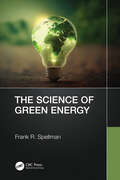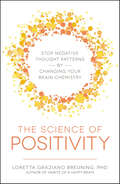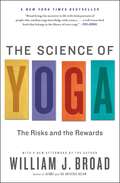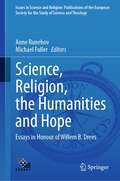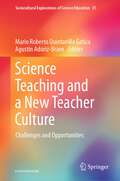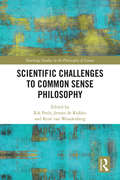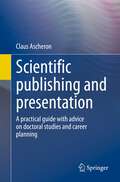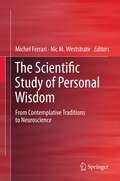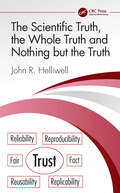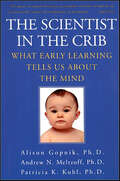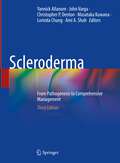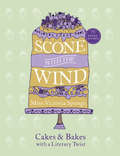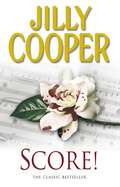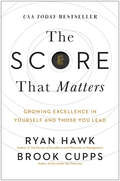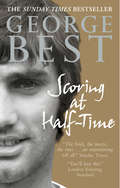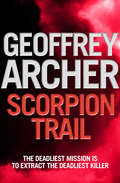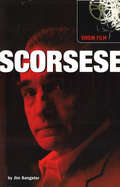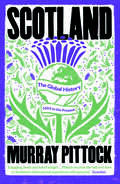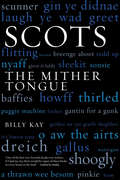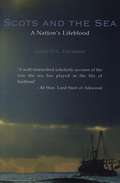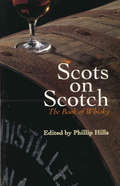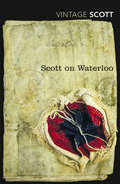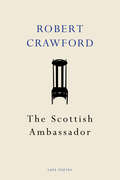- Table View
- List View
The Science of Green Energy
by Frank R. SpellmanConcern for the environment and the impacts of pollution have brought about the need to shift from the use and reliance on hydrocarbons to energy-power sources that are pollution neutral or near pollution neutral or renewable. Moreover, the impact of 200 years of industrialization and surging population growth threatens to exceed the future supply of hydrocarbon power sources. Therefore, the implementation of green energy sources is surging. The Science of Green Energy presents technologies and techniques, as well as real-world usage of and operation of today’s green energy-based applications. This practical book is designed to be used as an information source for the general reader, or for a course in energy, chemistry or in renewable energy engineering fields where green energy is becoming a key player. It is intended to fill a wide gap of missing information in published texts dealing with the green energy revolution currently in progress; it specifically provides information involving the many different sources of energy.
The Science of Positivity: Stop Negative Thought Patterns by Changing Your Brain Chemistry
by Loretta Graziano BreuningLearn the scientific benefits of positivism! Sometimes it's easiest to look for the worst in every situation--our brains have evolved to scan for problems in order to help avoid them. But you can transcend this natural negativity--if you know how.The Science of Positivity teaches you how cynical thought habits are formed, and how you can rewire yourself to go beyond them. Neurochemical expert Loretta Graziano Breuning, PhD, empowers you to transcend negativity by creating new thought habits. You'll learn simple, practical actions you can take to shift your thinking to a way that causes your brain to reward optimism with the release of happy chemicals. You can even permanently replace cynical thought patterns with realistic and optimistic thoughts. In just minutes a day for six weeks, you will build new pathways to see the world in new ways. Frustration is an inevitable part of life, but rather than using cynicism to manage frustration, you can rewire your brain to get beyond it.
The Science of Yoga: The Risks and the Rewards
by William J. BroadA lead science writer for The New York Times—and lifelong yoga practitioner—examines centuries of history and research to scrutinize the claims made about yoga for health, fitness, emotional wellbeing, sex, weight loss, healing, and creativity. He reveals what is real and what is illusory, in the process exposing moves that can harm or even kill. A New York Times bestseller.The Science of Yoga draws on more than a century of painstaking research to present the first impartial evaluation of a practice thousands of years old. It celebrates what’s real and shows what’s illusory, describes what’s uplifting and beneficial and what’s flaky and dangerous—and why. Broad unveils a burgeoning global industry that attracts not only curious scientists but true believers and charismatic hustlers. He shatters myths, lays out unexpected benefits, and offers a compelling vision of how the ancient practice can be improved.
Science, Religion, the Humanities and Hope: Essays in Honour of Willem B. Drees (Issues in Science and Religion: Publications of the European Society for the Study of Science and Theology #8)
by Anne Runehov Michael FullerThis book collects a multidisciplinary range of contributions focusing on the prolific and seminal work of Willem Drees in the fields of philosophy of religion, philosophy of the humanities, and science and theology/religion. Trained in both theoretical physics and theology/philosophy of religion, Drees holds doctoral degrees in both theology and in philosophy and, amongst other distinguished positions, held professorships at the University of Leiden and at the University of Tilburg. Drees was also Editor-in-Chief of Zygon, Journal of Religion & Science, between 2008 and 2018, and served as President of the European Society for the Study of Science and Theology (ESSSAT) between 2002 and 2008. In 2018, he was elected as member of the Royal Holland Society of Sciences and Humanities (KHMW). This contributed volume builds on Drees’ expansive and provocative scholarly contributions, notably around the concept and meaning of naturalism and the humanities to the fields of science and religion, as exemplified by his works Religion, Science and Naturalism (1996) and What Are the Humanities For? (2021). In a time where more and more young people across the globe are entering higher education such cross-disciplinary explorations and (re-)evaluations are vital to the field. Accordingly, by approaching his work from a variety of disciplines this collection illuminates the broad reach of Drees’ work and provides scholars from various fields with many new and rich opportunities avenues for research.
Science Teaching and a New Teacher Culture: Challenges and Opportunities (Sociocultural Explorations of Science Education #31)
by Mario Roberto Quintanilla Gatica Agustín Adúriz-BravoThis edited volume discusses various epistemological positions about science teaching and the complex processes of understanding and learning in the classroom. Including discussions around Natural Sciences teacher training models, as well as the development of logics of reflection on practice based on critical and dialogic interpretative visions guiding higher level competency learning. It brings together contributions from researchers promoting a coherent and robust methodological analysis, theoretically based on the systematization of evidence in different contexts within Europe and Latin America.While supporting innovation in teacher training and science teaching, it offers specific contributions and suggestions for classroom work in the subjects of Physics, Chemistry and Biology. It includes didactic guidelines for experimental practices, for the evaluation of scientific learning, as well as for the use of epistemology and the history of science in teaching. In addition, it’s considered an important contribution to the challenge of rebuilding science education programs as well as its correct implementation in schools and universities. This book is a translation of an original Spanish publication. The translation was done with the help of artificial intelligence (machine translation by the service DeepL.com). A subsequent human revision was done primarily in terms of content, so that the book will read stylistically differently from a conventional translation.
Science Techbook, Comprehensive Science 3 [Core Text Companion]
by Inc. Discovery EducationNIMAC-sourced textbook
Scientific Challenges to Common Sense Philosophy (Routledge Studies in the Philosophy of Science)
by Rik Peels; Jeroen de Ridder; René van WoudenbergCommon sense philosophy holds that widely and deeply held beliefs are justified in the absence of defeaters. While this tradition has always had its philosophical detractors who have defended various forms of skepticism or have sought to develop rival epistemological views, recent advances in several scientific disciplines claim to have debunked the reliability of the faculties that produce our common sense beliefs. At the same time, however, it seems reasonable that we cannot do without common sense beliefs entirely. Arguably, science and the scientific method are built on, and continue to depend on, common sense.This collection of essays debates the tenability of common sense in the face of recent challenges from the empirical sciences. It explores to what extent scientific considerations—rather than philosophical considerations—put pressure on common sense philosophy. The book is structured in a way that promotes dialogue between philosophers and scientists. Noah Lemos, one of the most influential contemporary advocates of the common sense tradition, begins with an overview of the nature and scope of common sense beliefs, and examines philosophical objections to common sense and its relationship to scientific beliefs. Then, the volume features essays by scientists and philosophers of science who discuss various proposed conflicts between commonsensical and scientific beliefs: the reality of space and time, about the nature of human beings, about free will and identity, about rationality, about morality, and about religious belief. Notable philosophers who embrace the common sense tradition respond to these essays to explore the connection between common sense philosophy and contemporary debates in evolutionary biology, neuroscience, physics, and psychology.
Scientific publishing and presentation: A practical guide with advice on doctoral studies and career planning
by Claus AscheronThe aim of this book is to help young scientists improve their oral and written communication skills and thus better sell their own results. This book is not a scientific textbook. It addresses the often forgotten question of how to present one's scientific results effectively and convincingly in talks and publications. In addition, this book provides background knowledge on the process of scientific publishing and scientific customs. The recommendations help to develop a good and effective work and communication style that will benefit you throughout your life and bring satisfaction in your work. Furthermore, concrete advice is given on how to write and successfully defend a dissertation and how to take the first steps in career planning.
The Scientific Study of Personal Wisdom: From Contemplative Traditions to Neuroscience
by Michel Ferrari and Nicholas WeststrateThe rich and diverse contributions to this volume span a wide variety of disciplines, from psychology and philosophy to neuroscience, by some of the most influential scholars in the emerging science of personal wisdom. As such, it is a collection of essential readings and the first publication to integrate both the spiritual and pragmatic dimensions of personal wisdom.The content of the book goes beyond speculative theory to present a wealth of scientific research currently under way in this expanding field. It also describes numerous promising methods now being deployed in the quest for scientific knowledge of the elusive, yet critical, phenomenon of personal wisdom. The book is an excellent introduction to the field for novice researchers as well as a stimulating and enlightening resource for established experts. Its broad appeal makes it a vital addition to the libraries of academics and practitioners in many disciplines, from developmental psychology to gerontology, and from philosophy to contemplative religious traditions such as Buddhism.
The Scientific Truth, the Whole Truth and Nothing but the Truth
by John R. HelliwellThere is a limited understanding amongst scientists, students, and the public about realizing trust in scientific findings. This should be a paramount objective. Scientists and the public need to know more about the link between the philosophy of science and science research methods. There is a limited understanding of why accuracy is important and that it is not the same as precision. Also, there is often the need to be pragmatic and so measure an approximation of a real system, and the classic case is reductionism in biology versus whole organism biology. The author brings these topics together in terms of trusting in science.Features Covers how scientific truth is perceived and increases the preparedness of early career scientists. Examines the relatively new field of machine learning and artificial intelligence as applied to crystallography databases in biology and chemistry for new discoveries. Describes the major changes in digital data archiving and how vast “raw data” archives are being increasingly developed for machine learning and artificial intelligence as well as complete truth. This unique volume will be of interest to pre-university and university undergraduate students, principally in science. Presents scientific research examples from physics, chemistry, and biology together with their methodologies.
The Scientist in the Crib: What Early Learning Tells Us About the Mind
by Alison Gopnik Andrew N. Meltzoff Patricia K. KuhlThis exciting book by three pioneers in the new field of cognitive science discusses important discoveries about how much babies and young children know and learn, and how much parents naturally teach them.It argues that evolution designed us both to teach and learn, and that the drive to learn is our most important instinct. It also reveals as fascinating insights about our adult capacities and how even young children -- as well as adults -- use some of the same methods that allow scientists to learn so much about the world. Filled with surprise at every turn, this vivid, lucid, and often funny book gives us a new view of the inner life of children and the mysteries of the mind.
Scleroderma: From Pathogenesis to Comprehensive Management
by Yannick Allanore John Varga Christopher P. Denton Masataka Kuwana Lorinda Chung Ami A. ShahThis fully-updated third edition of Scleroderma: From Pathogenesis to Comprehensive Managementbuilds upon the well-regarded approach in the previous editions to provide integrated, concise, and up-to-date synthesis of current concepts of pathogenesis and modern approaches to management of systemic sclerosis (scleroderma). With a multidisciplinary approach to comprehensive care, this book is easily accessible for health care professionals in many fields. Comprised of the authoritative work of international experts, the new edition includes extensive updated material reflecting major developments in the field. It presents a succinct and thoughtful synthesis of current pathomechanistic concepts, providing a valuable reference tool for basic and translational investigators working in the field. Scleroderma: From Pathogenesis to Comprehensive Management serves as an essential, all-inclusive and fully up to date resource for rheumatologists, pulmonologists, cardiologists, gastroenterologists, nephrologists and all those involved in the care of scleroderma patients.
Scone with the Wind: Cakes and Bakes with a Literary Twist
by Miss Victoria SpongeThe perfect gift for those who like a good read and a slice of good cake, Scone with the Wind features 75 delicious literary inspired recipes. Beautifully packaged with bespoke line illustrations throughout, it really is the most novel way to get to grips with the classics! 'Funny and useable present for bakers AND non-bakers!' -- ***** Reader review'Literally perfect!' -- ***** Reader review'Super super cute' -- ***** Reader review'The ideal gift for a book loving baker' -- ***** Reader review*************************************************************************************************Bake your way through the classics from Jane Eclair to Tart of Darkness, Banana Karenina and On the Rocky Road, Flapjack and the Beanstalk, Nineteen-eighty Petit Fours and many more!Arranged by genre, enjoy biscuits and cakes, puddings and pies from romance and comedy through to horror and science fiction, and discover fun, edible versions of your favourite books.Includes witty introductions and amusing illustrations throughout, baking essentials and themed menus for book clubs, parties and afternoon teas.The ultimate treat for book (and cake) lovers!Recipes include:Breakfast at TiffinsKey Lime and Punishment,Captain Corelli's Madeleines,To Kill a Battenberg,Vanity Fairy Cakes,Middlemarshmallows,The War of the Viennese Whirls,Much Ado About Muffins,Scone with the Wind and more!
Score!: A funny, romantic, suspenseful delight from Jilly Cooper, the Sunday Times bestselling author of Riders
by Jilly Cooper OBEJilly Cooper's most thrilling addition to the Rutshire Chronicles yet!Sir Robert Rannaldini, the most successful but detested conductor in the world, had two ambitions: to seduce his ravishing nineteen-year-old stepdaughter Tabitha Campbell-Black, and to put his mark on musical history by making the definitive film of Verdi's darkest opera, Don Carlos.As Rannaldini, his charismatic French director Tristan, and a volatile cast and crew gather at Rannaldini's haunted abbey for filming, it is inevitable that violent feuds, abandoned bonking, temperamental screaming, and devious plotting will ensue. But although everyone wished Rannaldini dead, no one actually thought the Maestro would be murdered. Or that after the dreadful deed some very bizarre things would continue to occur.-------------------------------------------'Romance, glamour, seismic sex and delightful comedy?this book is a slice of heaven: pure, blissful escapism' Kate Saunders, New Statesman'A deliciously funny, lusty, riproaring read with the added dimension of suspense and murder'Good Housekeeping'Has all the usual Cooper ingredients ... but with the added twist of a murder mystery' Linda Roberts, Daily Mail
The Score That Matters: Growing Excellence in Yourself and Those You Lead
by Ryan Hawk Brook CuppsUSA Today BestsellerRedefine success based on who you are and what you value with this indispensable guide from the authors of The Pursuit of Excellence and Surrender the Outcome.People love to keep score. Managers keep score of a range of business metrics: market share, revenue, profit margin, growth rate. In our personal lives, social media has us keeping score by likes and followers.These external scores are outcome-driven and serve as proof of our success—money, fame, material possessions, wins—but this constant chase for more validation often leaves us feeling exhausted and empty.In The Score That Matters, Ryan Hawk and Brook Cupps show that the internal score is what matters most—it reveals whether we are living in alignment with our purpose and values. It also measures how we are leading ourselves and others, prompting us to:Differentiate between the two scoreboards that run our lifeUse our fear as fuelAvoid the poison of comparisonEmbrace the mundanity of excellenceRegulate our emotional thermostatCreate a mentality for attacking adversityOffering both descriptive and prescriptive advice and anecdotes, The Score That Matters will help you unlock true fulfillment and happiness by discovering your purpose, identifying your values, and creating critical behaviors and living them faithfully every day in all aspects of your life.
Scoring At Half-Time: Adventures On and Off the Pitch
by George BestMichael Parkinson: 'What was the nearest to kick-off that you made love to a woman?'George Best: 'Er- I think it was half-time actually'George Best was the first celebrity footballer and to many the greatest British player ever. In Scoring at Half-Time he gathers together his favourite memories, stories and anecdotes from his experiences in and out of the game over the last forty years. No dressing room door is left unopened, no player's bar tale untold and no secret kept in this fond, humorous look at football's golden era from the man who was usually there when it happened. Inside stories and lurid tales about George, Bobby, Denis, Nobby and Fergie amongst others. Scoring at Half-Time will delight anyone who has ever wanted to spend time in the company of the footballing legend.
Scorpion Trail: A deadly mission to hunt a deadly killer…
by Geoffrey Archer_______________________________________Alex Crawford has been out of MI5 and the combat zone for twenty years, but now fate has thrust him back into the front line.Though he is an aid worker, the secret service minders who have protected him for so long have reactivated him: they want information about the man who perpetrated a massacre in a Muslim village in Bosnia at the height of the Kosovo War.His target is the most ruthless killer in the whole war zone: Milan Pravic, codename the Scorpion. And the only eyewitness to the massacre is a twelve-year-old girl whom Pravic will do anything to silence.
Scorsese: Virgin Film
by Jim SangsterMartin Scorsese’s obsession with sin and redemption, conflict and violence runs through much of his work. This essential guide to Scorsese explores his career from his early student works, including It’s Not Just You, Murray!: through his personal examinations of his Italian American heritage in Mean Streets, Italianamerican and Goodfellas: the extreme violence of Raging Bull, Taxi Driver and Cape Fear: and the religious themes – from a director who originally wanted to be a priest – of The Last Temptation of Christ and Kundun. Including all Scorsese’s films up to Gangs of New York, this is a comprehensive study of the work of this widely respected film maker. Also covering his influences, the controversy surrounding his films, exhaustive music lists and long-time collaborations, this is an extensive analysis of the most consistently passionate, committed and inventive film director of the last thirty years.
Scotland: The Global History: 1603 to the Present
by Murray PittockAn engaging and authoritative history of Scotland’s influence in the world and the world’s on Scotland, from the Thirty Years’ War to the present day Scotland is one of the oldest nations in the world, yet by some it is hardly counted as a nation at all. Neither a colony of England nor a fully equal partner in the British union, Scotland has often been seen as simply a component part of British history. But the story of Scotland is one of innovation, exploration, resistance—and global consequence. In this wide-ranging, deeply researched account, Murray Pittock examines the place of Scotland in the world. He explores Scotland and Empire, the rise of nationalism, and the pressures on the country from an increasingly monolithic understanding of “Britishness.” From the Thirty Years’ War to Jacobite risings and today’s ongoing independence debates, Scotland and its diaspora have undergone profound changes. This groundbreaking account reveals the diversity of Scotland’s history and shows how, after the country disappeared from the map as an independent state, it continued to build a global brand.
The Scotland of Queen Mary and the Religious Wars 1513-1638
by Agnes Mure MacKenzieHistory of the Anglo-Scottish Wars of the 16th-17th century.“BY the end of the Dark Ages, Scotland, or most of our Scotland, was a kingdom. By the High Middle Ages, she had become a nation, and towards the end of the thirteenth century she was on the verge of a willing and friendly union with her neighbour nation, that for a hundred years had been at peace with her, an apparent friend. Then a child queen died: and Scotland, for the next three hundred years, had to fight a war for mere national existence, and that against enormously heavy odds. Nevertheless, by the end of the Middle Ages, by the years between the fall of the Eastern Empire and the discovery of the New World, she was, miraculously, still a nation, with her native culture vigorous and vital, and a status in the general affairs of Europe out of proportion to her little size.I have elsewhere attempted to give some account of two hundred and seventeen years of that long war. This book takes up the story at a point where it still had eighty-three years of its course to run, or ninety if one counts to its full close, the crowning of James King of Scots as King of England. But the end of it was not the end of war, for fifteen years after Flodden begins another, that for two centuries and a third thereafter made ‘blood and fire and pillars of smoke’ in Scotland, ‘the horsemen mounting, the flashing sword, and the spear’ for the star called Wormwood had fallen into her waters, and the strife of men in arms within their own country, that bursts out at least once in a lifetime through those years, is only the surface of a deeper conflict, that did not end when the clans went down at Drummossie.”
Scots: The Mither Tongue
by Billy KayScots: The Mither Tongue is a classic of contemporary Scottish culture and essential reading for those who care about their country's identity in the twenty-first century. It is a passionately written history of how the Scots have come to speak the way they do and has acted as a catalyst for radical changes in attitude towards the language. In this completely revised edition, Kay vigorously renews the social, cultural and political debate on Scotland's linguistic future, and argues convincingly for the necessity to retain and extend Scots if the nation is to hold on to its intrinsic values. Kay places Scots in an international context, comparing and contrasting it with other lesser-used European languages, while at home questioning the Scottish Executive's desire to pay anything more than lip service to this crucial part of our national identity. Language is central to people's existence, and this vivid account celebrates the survival of Scots in its various dialects, its literature and song. The mither tongue is a national treasure that thrives in many parts of the country and underpins the speech of everyone who calls themselves a Scot.
Scots And The Sea: A Nation's Lifeblood
by James DavidsonWith over six thousand miles of rugged coastline, nowhere in Scotland is more than forty-five miles from tidal waters, and seven of the biggest towns and cities are seaports. No wonder then that the sea has shaped Scotland, and in turn the Scots have helped to shape maritime history, trade and communications.Scots and the Sea is a unique and compelling account of a small, sparsely populated country's relationship with the most powerful force on earth. It is a celebration of the courage and endurance of fishermen and their families, the selfless bravery of lifeboat volunteers and the individual brilliance of leaders like Admiral Cochrane, who helped establish free nations across the globe. The illicit activities of scoundrels like Captain Kidd also provide a taste of the darker side of the story. Scotland's proud maritime tradition is traced through this volume, which examines the development of trade, the founding of a Scottish merchant navy and the pressures towards Union with England. It explores ports, harbours and shipyards, and outlines the vital role Scotland has played in shipbuilding and marine engineering - from the galleys and longships of early history to clippers, steamships, ocean liners, hovercraft and oil rigs. Also recounted are the exploits and achievements of Scots in all these fields, including those of James Watt, William Symington, Henry Bell and Robert Stevenson. Finally, it takes a look into the future, where Scottish research into wave and tidal power could become vital in providing a source of sustainable energy. Over the years, many Scots have made their living and their fortune from the sea, others have lost their lives to it – Scots and the Sea is a tribute to all of them.
Scots On Scotch: The Book of Whisky
by Philip HillsThis is a book in which Scots tell the truth about their national drink. Ignoring the mythology which surrounds Scotland and her favourite tipple, it is written by people who are passionate about their subject, who know what they write about and who love what they know. It is about whisky and about Scotland - the real Scotland behind the invented one of the advertisers and the gift shops. Over the last 40 years Scots have reasserted their spiritual and cultural independence, and as part of this process they have redicovered the unique quality of their national drink. This renaissance not is a cause for celebrations not only by Scots but also by the rest of the world. Malt whiskies have risen from a minority taste in a small nation to become internationally recognised as the connoisseur's spirit par excellence.Contributors include acclaimed writers Ruth Wishart, George Rosie, Trevor Royle, Colin McArthur, Alan Bold and Derek Cooper; Russell Sharp, formerly chief chemist at Chivas and now president of the Caledonian Brewing Company; and poets Hamish Henderson, Hugh MacDiarmid and Norman McCaig.
Scott on Waterloo
by Sir Walter ScottOn the 200th anniversary of the Battle of Waterloo discover a fascinating primary source: Walter Scott's accounts of his journey to the battlefieldIn the immediate aftermath of the Battle of Waterloo tourists flocked from Britain to witness the scene of the most important conflict of their generation. Walter Scott was among them, and with a commission from his publisher for a travel book and a long poem. These prose and verse accounts bring to vivid life the carnage, spectacle and excitement of a fascinating period of European history. Brilliantly introduced and annotated by Paul O'Keeffe, this edition elucidates and contextualises Scott's first-hand account of his travels, his dashing epic, ‘The Field of Waterloo’ and the eerily chilling 'Dance of Death'.
The Scottish Ambassador
by Robert CrawfordOne of Scotland’s most celebrated poets, Robert Crawford has long been a passionate and articulate ambassador for his country and its culture, its people and its landscape. The Scottish Ambassador fuses individual and communal voices in poems that resonate far beyond their points of origin. Engaging with Zoroastrian, Chinese and Greek as well as with Scottish antecedents, Crawford’s poems have an arresting range and a lyrical energy. He negotiates with intensity and wit between a deep sense of human universals and a heartfelt fidelity to individual places. Ranging from Jerusalem to Iona, New York City to Shetland, this is a collection of international range that continually zeroes in on the particular – and the particularly Scottish. At the book’s centre is a series of intimate, funny, eloquent portraits of cities which are at once remarkable public poems and outpourings of love.
